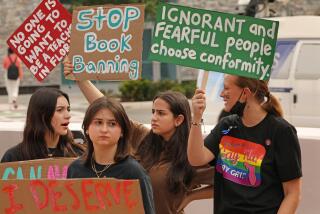Pravda Muzzled for 1st Time Since Nicholas II’s Rule : Media: Yeltsin temporarily shuts the Communist Party’s key publication for backing the failed coup.
- Share via
MOSCOW — The presses of one of the world’s best-known newspapers ground to a halt at 3 p.m. Friday in a sprawling print shop in northwestern Moscow when Russian Federation President Boris N. Yeltsin, like Czar Nicholas II more than 70 years before him, shut Pravda down.
Yeltsin, in a decree, accused Pravda of actively supporting this week’s attempted coup and temporarily suspended its publication. Five other Communist Party papers also were affected, including one, the feisty conservative party weekly Glasnost, which had not even printed.
There was no indication how long the ban would last. But Pravda editors accused Yeltsin--the embodiment of democratic rule for millions of Russians--of being just the latest incarnation of autocracy and mob rule in the Soviet Union. They asserted he was trying to kill their paper.
“This is the ninth time that Pravda has been axed,” said Gennady N. Seleznev, acting editor in chief. “Nicholas II of Russia did it eight times. Boris the First has now done it for the first time.”
Half-finished page proofs of Pravda’s Friday issue hung limply on the walls in the gleaming conference hall as a small alabaster bust of V. I. Lenin appeared to look pensively at the remnants of what the Communist revolutionary had founded on May 5, 1912.
Once a thundering voice of the state, telling people what to think and what to say, Pravda changed in the perestroika years. Its chief editor, Ivan T. Frolov, turned the paper into Gorbachev’s tedious mouthpiece, losing subscribers but still officially serving as the flagship of the press empire of the Communist Party.
On Friday, Pravda editors asserted that they were now victims of censorship, and they called on the journalists of the world to unite--in its defense.
“This is a clear violation of the freedom of press,” Seleznev argued. “Do you have Communist newspapers in Australia?” he asked an Australian radio correspondent. “You do? And they’re not banned? So I want Russia to be at least as good as Australia.
“We are also sending an energetic protest to both Mikhail S. Gorbachev and Boris N. Yeltsin, and we are planning legal action because we firmly believe the reasons for the ban do not apply to us,” Seleznev continued. “Quite apart from political aspects, this represents a human tragedy for more than 500 people on the Pravda payroll. We have more than 3 million subscribers. Many world leaders read Pravda habitually, what of all this?”
But the paper has only itself to blame for what happened to it, as its spokesmen freely admitted during a press conference.
“This is the price for being the newspaper of the Politburo and the Central Committee, and not of the entire party,” Vladimir S. Gubarev, Pravda’s science editor, remarked bitterly. “But let me tell you this: Banning Pravda is not aimed at the paper itself. This is the first step toward destroying the entire party.”
Pravda staffers saw the sudden shutdown as especially outrageous because only the day before they had unilaterally decided to drop their link with top party bodies. Friday’s editions were the first to carry a different slogan. It said Pravda is “The political newspaper of the CPSU (Communist Party of the Soviet Union)” instead of carrying the seven-decade-old reference to the Politburo and the Central Committee.
Over the years, Pravda’s six pages of dense gray type had become an integral part of breakfast for party members, an estimated 18 million of them during the paper’s heyday.
Pressed for his own view of the party’s performance during the putsch, Seleznev contended that Communists helped to defend the Russian government building and participated in anti-coup protests.
“We know this,” he said, “because lots of party cards were publicly torn up and burned.” Hundreds of thousands are quitting the party these days and there is no way to predict what will be left of the Soviet Communist Party when--and if--this process stops some time later, he added.
As for top Pravda editor Frolov, he is convalescing after surgery in Germany, and “this was the only reason why the general conference of Pravda employees did not fire him yesterday,” a spokesman explained curtly. “It’s out of pure pity.”
In a front-page message to readers Thursday, Pravda blamed the party leadership for “a lack of a clearly expressed position in connection with the events in the country.” But the paper’s representatives said Pravda--and seven other newspapers permitted by the State Emergency Committee to publish during the coup--had no choice but to print what they were told by the committee’s censors.
Seleznev, a Central Committee member, added, “We are not angry--we are just bitter that Yeltsin has taken the cue from the very State of Emergency Committee he so passionately condemns. We are witnessing retribution meted out to the newspapers whose opinions do not suit him.”
RELATED STORY: D2
More to Read
Sign up for Essential California
The most important California stories and recommendations in your inbox every morning.
You may occasionally receive promotional content from the Los Angeles Times.










